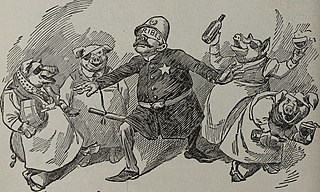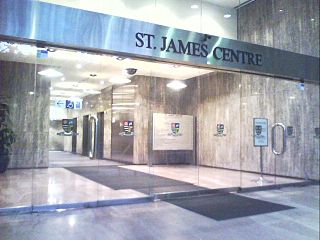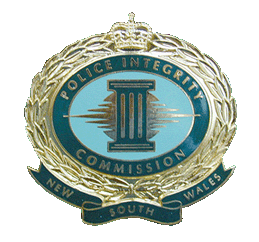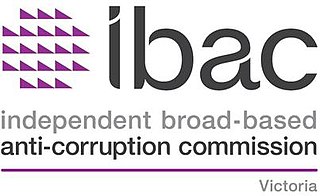
Police corruption is a form of police misconduct in which law enforcement officers end up breaking their political contract and abusing their power for personal gain. This type of corruption may involve one or a group of officers. Internal police corruption is a challenge to public trust, cohesion of departmental policies, human rights and legal violations involving serious consequences. Police corruption can take many forms, such as bribery.
A royal commission is a major ad-hoc formal public inquiry into a defined issue in some monarchies. They have been held in the United Kingdom, Australia, Canada, New Zealand, Norway, Malaysia, Mauritius and Saudi Arabia. In republics an equivalent entity may be termed a commission of inquiry.

Law enforcement in Australia is one of the three major components of the country's justice system, along with courts and corrections. Law enforcement officers are employed by all three levels of government – federal, state/territory, and local.

The Western Australia Police Force, colloquially WAPOL, provides police services throughout the state of Western Australia, an area of 2.61 million square kilometres, the world's largest non-federated area of jurisdiction, with a population of 2.66 million, of which 2.11 million reside in the Perth Metropolitan Region.

The Independent Commission Against Corruption (ICAC) is an integrity agency of the Government of New South Wales responsible for eliminating and investigating corrupt activities and enhancing the integrity of the state's public administration. The commission was established in 1989, pursuant to the Independent Commission Against Corruption Act, 1988 (NSW), modeled after the ICAC in Hong Kong.
Anthony Raymond Lauer, was an Australian police officer who served as the Commissioner of the New South Wales Police from 1991 until 1996. In February 1996, Lauer's term ended in controversy with his resignation soon after the start of the Wood Royal Commission into police corruption.

The Royal Commission into the New South Wales Police Service, also known as the Wood Royal Commission, was a royal commission held in the State of New South Wales, Australia between 1995 and 1997. The Royal Commissioner was Justice James Roland Wood. The terms of reference were to determine the existence and extent of corruption within the New South Wales Police; specifically, it sought to determine whether corruption and misconduct were "systemic and entrenched" within the service, and to advise on the process to address such a problem.
The blue wall of silence, also blue code and blue shield, are terms used to denote the informal code of silence among police officers in the United States not to report on a colleague's errors, misconducts, or crimes, especially as related to police brutality in the United States. If questioned about an incident of alleged misconduct involving another officer, while following the code, the officer being questioned would perjure themselves by feigning ignorance of another officer's wrongdoing.
The Royal Commission into the Building and Construction Industry, or informally the Cole Royal Commission, was a Royal Commission established by the Australian government to inquire into and report upon alleged misconduct in the building and construction industry in Australia. The establishment of the Commission followed various unsuccessful attempts by the Federal Government to impose greater regulation upon the conduct of industrial relations in that industry.
Ian Michael Macdonald is a former Australian politician and currently undergoing court proceedings and was a member of the New South Wales Legislative Council from 1988 to 2010 representing the Labor Party. Between 2003 and 2010, Macdonald held a range of ministerial responsibilities in the Carr, Iemma, Rees, and Keneally ministries. Macdonald, who joined the Labor Party in 1972, had his membership of the party terminated in 2013 for bringing the party into disrepute.
The Cole Inquiry, formally the Inquiry into certain Australian companies in relation to the UN Oil-For-Food Programme, was a Royal Commission established by the Australian government pursuant to the Royal Commissions Act 1902 to investigate "whether decisions, actions, conduct or payments by Australian companies mentioned in the Volcker Inquiry into the United Nations Oil-for-Food Programme breached any Federal, State or Territory law."
The Office of Police Integrity (OPI) was the Australian state of Victoria independent police oversight and anti-corruption agency established by the Victorian Government in November 2004. OPI ceased operation on 9 February 2013 and was replaced by the Independent Broad-based Anti-corruption Commission (IBAC). OPI's official role was to detect, investigate and prevent police corruption and serious misconduct and to ensure that police members had regard to the human rights set out in the Victorian Charter of Human Rights and Responsibilities.

The Corruption and Crime Commission is an independent anti-corruption integrity agency established on 1 January 2004 to improve the integrity of the Western Australian public sector and investigate allegations of misconduct against public officers. It took over from the Anti-Corruption Commission and has jurisdiction over all State Government departments, instrumentalities and boards as well as universities and local governments. This includes more than 148,000 employees in 278 public authorities.

The Police Integrity Commission, was a statutory corporation of the New South Wales Government, responsible for the prevention, detection, and investigation of alleged serious misconduct in the Police Force in the state of New South Wales, Australia. The mission of the commission was to be an effective agent in the reduction of serious police misconduct. On 1 July 2017, the Police Integrity Commission was abolished and replaced by the Law Enforcement Conduct Commission.
Nicola Maree Gobbo, sometimes known as Nikki Gobbo, is an Australian former criminal defence barrister and police informant.

Corruption can take many forms, and can distort how public policy is made or implemented. This article discusses the responsibilities of the various agencies involved in combating corruption in Australia. While Australia is a wealthy democracy, over the decade since 2012, Australia's ranking in the Corruption Perceptions Index from Transparency International has slipped from 7th place in 2012 to 13th in 2022, where the country ranked first is perceived to have the most honest public sector. Additionally, there is a public perception that corruption in Australia is increasing. All states have broad-based anti-corruption agencies, and a national anti-corruption commission has been operational since July 2023.

Corruption in Slovenia is examined on this page.
The Royal Commission into Trade Union Governance and Corruption was a Royal Commission established by the Government of Australia to inquire into alleged financial irregularities associated with the affairs of trade unions. The Australian Workers Union, Construction, Forestry, Maritime, Mining and Energy Union, Electrical Trades Union, Health Services Union and the Transport Workers Union were named in the terms of reference. The Royal Commission inquired into the activities relating to slush funds and other similar funds and entities established by, or related to, the affairs of these organisations.

The Independent Broad-based Anti-corruption Commission (IBAC) is Victoria's anti-corruption integrity agency with jurisdiction over the public sector. It does this by:
The Law Enforcement Conduct Commission oversights, monitors and investigates allegations of serious misconduct by the NSW Police Force (NSWPF) and NSW Crime Commission (NSWCC). It was set up on 1 July 2017 to replace the Police Integrity Commission and the Police and Compliance Branch of the Office of the Ombudsman









